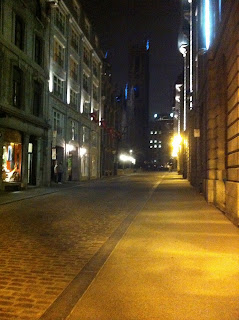
On day five we travelled to Montreal, again through a bleak and recently snow-ravaged countryside. I imagine in weeks from now it might be green and springing back to life. But for now it is grim shades of grey and spindly, spidery, lifeless trees. It was actually snowing in Montreal when we arrived - which was kind of cool actually, not that the locals were too impressed. The trains through this part of Canada are fast and fabulous and offer wifi onboard, so it was a good opportunity to catch up on emails, do a bit of research and ignore the misery outside. In Montreal I met with Linda Shohet from the Literacy Assistance Centre of Quebec who does great work around health literacy and works collbaoratively with hospitals - a model I would love to be able to replicate at home. I also got to visit St Mary's Hospital and saw a couple of different faces of the Montreal General, just one of the many campuses (six in all, I believe) of the Montreal University Health Centre network.
So rather than bore you with the intricate details of each and every one of my visits (you can read that in my final report) I'll just talk about what Canada has taught me, what I'm left wondering about and what might be able to bring home. I have learnt a great deal in Canada, some of it new, some of it affirming. No one perfect model, but as Adam (my partner) says I'm not going to find utopia in any one place, but I will find pockets of really great work that I might be able to pull together into something of an ideal.
Canada has great pockets of work in health literacy, it's fragmented (as it is everywhere) and it doesn't always identify with the notion of health literacy. For example, there are a number of interventions in the hospital context that are called "patient engagement" projects but the chief aim is improve the way that the hosptial communicates with patients. It begs the question - is an intervention that aims to give a nurse more time to deliver information a health literacy intervention? What about an intervention that involves the patient in changeover discussions, or an intervention that uses patient reps to talk to inpatients about their experience of the hospital? These, and others like them are all being played out in hospitals across North America but are called TCAB interventions or Transforming Care at the Bedside. There may even be pilot projects happening in Australia but I'm not aware of them. The concept of TCAB comes out of the Institure for Healthcare Improvement in the US - I haven't investigated the model or philosohy further but intend to.
The most active pockets of health literacy work seem to be in Montreal and British Columbia (where I didn't visit). There are also pockets of work in research in Ottawa, where of course the decision aid was born. There is not a lot of collaborative work in this area between the research community and hospitals but there seems to be more in primary care and vulnerable communities, chronic illness and self care. I have become aware of a mapping project that is happening out of BC, funded by the Public Health Agency (the government body) and being carried out by the BC university. My understanding is sketchy because the work is still under a thin veil of secrecy but, very simply, they seem to be developing a model for health literacy and gathering existing case studies across the country to demonstrate the model. This work could provide the groundwork for evaluating HL projects in our context. I am emailing the brains behind this project in the hope that I can get hold of some of the work as it becomes available.
Canadians talk about projects as a "piece", I quite like that because it makes you think of each project or intervention as a discreet "piece" of work, with its own aims, goals and outcomes. Even if the intervention is tiny, such as individual white boards for inpatients to keep them informed about staff and daily activities, simple but the health literacy gain is huge. I have collected many pieces for my utopia here in Canada and now I'm off to find more in the US.
At the airport now and the tarmac looks like a lake and the tiny plane that will carry us to Boston is barely visible through the shroud of rain. Nevertheless Montreal is a beautiful city and anyway, my business here is about meeting people, the kind of tourism that doesn’t rely on weather.
No comments:
Post a Comment